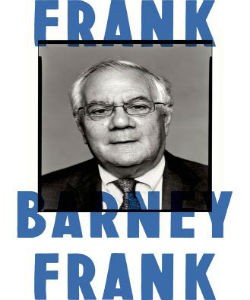When it debuted, I didn’t see Schoolhouse Rock’s How a Bill Becomes a Law. And this great site was not yet available.
It was through direct experience that I learned about government. From civics classes in a public Ohio high school to my own reading. Through all my work in an association and as a consultant to many organizations, my professional activities and colleagues, I learned more about how the U.S. government operates. And I do still read and watch the news!
But nothing was like reading Frank: A Life in Politics From The Great Society to Same-Sex Marriage, a book that is instructive, funny, amusing and downright smart.
Okay, wait a second before you accuse me of being partisan and liking it for the political party of the author, former Massachusetts Rep. Barney Frank. It helps that I had met Barney Frank once and found his personality at once abrasive and warm. And my political activism warmed to the subjects for which he fought.
But what I really learned is the inside view of the complicated process of governing and the importance of forming alliances “across the aisle,” of building networks of people in and outside government, and how to manage the process. That for me spoke volumes to what I blogged about in my last Friday With Joan e-newsletter. Barney Frank had strong support from Republicans as well as Democrats during his career, in politics in Massachusetts, and in Washington, where former Sen. Alan Simpson, a Republican, was one of his greatest allies.
I knew that Barney Frank was a well-respected lawmaker, especially for his knowledge of Robert’s Rules of Order, the Constitution and the rules of the House of Representatives. I remember when, after hearing he was going to retire, feeling there would be void in the House.
In his book he says, “My sense of humor, which I am glad to have, and which I cannot think of anything I did to earn, was also a great polemical weapon. The force of an argument is greatly magnified when it can be phrased as a quip. ...When Reagan paired his opposition to abortion with a budget cut for funds for pregnant women and poor children, I jibed that he ‘apparently believes that from the standpoint of the federal government, life beings at conception and ends at birth.’ …a leader of an anti-abortion drive in the House even cited it in support of better funding for mothers and children.” I take life so seriously and literally that I envy Mr. Frank’s sense of humor and easy quip. He’s a natural at improve(isation) ... and I guess I need more classes with meetings industry improvisation facilitator Izzy Gesell to get it right!
The book is worth reading and pairing with this week’s blog because our industry really hasn’t found its voice or a way to fuel passion among those who work on the planning side of the industry. [Note: The unions have organized in many segments—F&B, airline mechanics, flight attendants and pilots, housekeepers—of our industry. We planners and sales and convention services people haven’t yet individually (much) and certainly not collectively, shown Congress and the public why meetings are of such great value.]
“In matters pertaining to finance, the real power to influence Congress rests not with the big banks but with a group of organized interests with genuine grassroots memberships throughout the country.” (emphasis mine)
What Barney Frank wrote about was what grassroots campaigns have done for movements and people. There are lots of other examples:
- Donald Trump’s Super Fans.
- The Tea Party movement.
- Many more examples exist, “right” and “left" viewpoints on civil rights, and especially this one, a brochure from the early days of the Civil Rights Movement, where information—like the history we are missing in our industry—is laid out.
Even if you are staunchly anti-Democrat or staunchly-anti Barney Frank, read the book anyway. The lessons that we can apply in our own industry to make meetings really matter are too great to miss.
If you haven't read it yet, check out my blog post on standing up for our industry.




